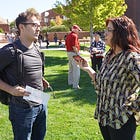Inside the 2024 election coverage of student journalists in CA, NM, OK
Summer travel and collaboration offer Gen Z journalists a fresh take on election coverage

Sarah Hutter spent 70-80 hours a week this summer traveling across the country with her team of student journalists to amplify Gen Z voices in the 2024 election.
Their coverage spanned interviews with survivors of the Mandalay Bay shooting in Las Vegas, immigration at the California-Mexico border and a protest during the Israeli prime minister’s speech in Washington, D.C.
This was part of “E2024,” a project led by The Loyolan’s 20-person team at Loyola Marymount University, covering the election through a Gen Z lens for a Gen Z audience.
“There's a lot of power in being able to share stories from Gen Z by Gen Z for Gen Z, rather than just other people trying to assume and guess what we're going through or needing to know,” said Hutter, the team’s executive producer.
The reporting tour began with Hutter’s casual text to her advisor over the summer: “Haha, what if we got an E2024 reporter in each swing state?”
“And they're like, ‘love it, let's go,’” she said. “So we had a different reporting team traveling to six of the seven swing states this summer.”
Hutter’s journey through swing states is just one example of how student journalists are stepping into critical roles during this election season.
This experience, shared at a recent Nutgraf panel, echoes similar stories from her peers in New Mexico and Oklahoma.
They discussed the challenges of election reporting, how student journalism gives them an inside look at voters’ perspectives and how they’re using their platforms to bridge the gap between students and national issues.
At The Daily Lobo, Editor-in-Chief Lily Alexander’s team ensures its coverage reflects their audience by developing a community-focused survey in collaboration with other newsrooms in New Mexico.
The survey asks about participants’ concerns, how their community differs from others, and what news outlets might have missed.
Alexander was surprised to see the diversity of concerns among students, contrary to her assumption that only one or two issues would dominate.
These responses helped guide their interviews, questions and story angles, saving time for their small newsroom.
Like Alexander in New Mexico, Peggy Dodd of OU Daily aims to connect with voters, especially in Oklahoma’s “purple pockets,” where voting occasionally swings away from expected trends.
The editor-in-chief said the outlet focuses on why people vote, rather than just the results. Reaching these communities requires building strong relationships, she explained.
“Personally, I’ve never been called fake news or anything like that with my audience because of the pre-existing outreach my organization has done,” she said.
Dodd also found it surprising how little people knew about the down-ballot issues beyond Congressional and White House races.
“They didn't know about the state questions, they didn't know about really that full consistency of the ballot,” she said. “So having those relatively easy stories to accomplish that are ballot breakdowns, we're really serving that audience.”
Access is a big challenge
Asked about obstacles during election coverage, Hutter shared that, as a college student, her access differs significantly from that of a Washington Post reporter, but people are generally willing to help.
She recalled her experience near the Mexican border where she navigated a “rabbit hole chase,” trying to locate one source in person using a satellite phone that had spotty service, after getting that contact from a fellow journalist.
Hutter, her advisor, and her team followed a “pirate map” through Jacumba Hot Springs, California, driving past horse stalls and a portable toilet, calling restaurants, a library and a town hall — all leading to a great story.
“I had complete false bravery. I think I was doing it to reassure the rest of the team that it was fine,” she said.
For Alexander, getting access to people in power is often a challenge.
Introducing herself as a student journalist is a “double-edged sword” — some find it interesting, while others dismiss her.
She and another reporter managed to get a statement from a Congresswoman after seven calls and voicemails within a week. She recommended reaching out to other journalists or alumni for help when access is blocked.
Ready for the unexpected
These student journalists are ready to tackle any obstacles as election results unfold. Each newsroom has crafted strategies to respond to unexpected or “jarring” events.
For OU Daily, Dodd said it treats such events as breaking news — it’s something that happened before.
Dodd recalled a candidate falsely claiming ballots weren’t accepted at the Cleveland County Election Board, which OU Daily quickly debunked with a simple call.
“We are good friends with the County Election Board to verify any claims of any sort of election malfeasance,” Dodd said.
Similarly, The Lobo will keep staff on standby during the week for quick response to any incidents such as protests, while prioritizing safety.
“We recently procured some very bright neon vests that say ‘press’ massively on the back of them, which I think … could come in handy again,” Alexander said.
Hutter’s team at The Loyolan will watch for stories on ballot problems and election integrity, ensuring thorough fact-checking in everything they publish.
“I always tell, one of the first rules for my interns is hyperlinking more than you think is even appropriate,” Hutter said, encouraging her staff to provide facts over emotional appeals.
‘Really hard’ to prioritize mental health
These student journalists put in full-time hours, often working around 70 hours a week, all while balancing coursework.
“I'm tired,” Dodd admitted. “But those 70 hours have been some of the most fulfilling hours of my life.”
Prioritizing mental health is tough, but necessary, they said. They have different approaches.
Hutter talks to her psychologist mom and finds creative outlets like dancing. She’s also intentional about taking breaks.
“If I only have five minutes between walking from class to the newsroom,” she said, “I'm aware of those five minutes and I'm intentional about the fact that I'm not working.”
Dodd takes walks with her advisor and catches up on sleep after work.
“It's really hard to put yourself above the coverage that you deemed so important,” she said.
That’s why Alexander tries to make coverage more enjoyable by turning events like debate watch parties into friendly hangouts with snacks — while taking notes and discussing it together.
Staying organized
With the pressure and long hours, organization plays a key role in balancing their election coverage with the demands of school and maintaining mental well-being.
At OU Daily, a massive spreadsheet and regular meetings keep everything on track.
The Lobo has weekly meetings with staff and two newsroom calendars — one whiteboard and one paper — to help manage event dates.
E2024 also holds weekly staff and executive meetings, with constant internal communications to keep everyone updated, especially with the travel schedule.
“I think there was one day where I woke up and I didn’t have any text from my advisors and I freaked out,” Hutter said, thinking everything fell apart.
It was just a Sunday.
Listen to the full discussion below:
💬 I want to hear from you: What is it like for you to cover the 2024 presidential election as a student journalist? Reach me at nutgrafnews@gmail.com.
Story Spotlight:
💵 Press Forward awarded $20 million to 205 local news outlets including eight student newsrooms.
⛔ Vermont military school Norwich University suspended its student newspaper for the whole semester after The Guidon published multiple stories critical of the university, VT Digger reported. The university president said the newspaper would resume publishing with “ethics oversight.”
🚨 The GW Hatchet’s reporting about allegations of departmental gun safety violations and inadequate training within the George Washington University Police Department led to the chief’s resignation.
💰 The Daily Targum has received a $100,000 grant from the New Jersey Civic Information Consortium after it lost funding from the university, NJ Advance Media reported.
✍️ The Sunflower is keeping its eyes on plagiarism allegations against its Wichita State University president after a report from Kansas Reflector. In an opinion piece, an editor headlined “Students would get punished for plagiarism. Our president should, too.”
Featured Opportunities:
Check out 100 spring media internships from a special MEOjobs of the Week newsletter edition.
Politico posted its internship roles for the spring and summer of 2025 at various locations.
Central Desi is hiring New Jersey-based reporters for its fellowship program. Students and recent grads are welcome to apply by Oct. 31.
The Minneapolis Star Tribune is looking for summer interns. Applications are due by Nov. 1.
In Old News is inviting student journalists to contribute to a free library of election video footage. This is a paid opportunity, apply before Nov. 4.
Thrill Mag is looking for journalism and video content creator interns. Apply before Nov. 30.








